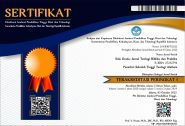BERLAKU ADIL DALAM KEMEWAHAN: PEMBACAAN ATAS AM 6:1-7
Abstract
Abstract: In the Book of Amos, the picture of social life is so factual. Unfortunately, this situation is dominated by a problematic situation where people are being oppressed by the authorities, whoever they are. But what needs to be looked at is whether social justice was possible at that time? The answer is perhaps as championed by the prophets, including the Prophet Amos. So, what does fairness mean? The story of the Prophet Amos, who preached among the Israelites, offered a perspective of being fair amid luxury for humans today. This study aims to present the theme of justice in luxury life. The writing of this article uses the synchronic method with the help of G. Lenski’s theory and analyses the world of the text and the world in front of the text, then adds the repertoire of searching expert opinions synthesized by the author. It’s acceptable to live a luxurious life if it doesn’t hurt others; that’s the message of the Prophet Amos, the messenger of God. Living in luxury is not wrong; it’s just not right when it is obtained from the sacrifices and suffering of others and even exhibited for the needy (Am 4:1-3, 5:11-12, 8:4-6). The Israelites forgot that the luxury they got was a gift from God.
Abstrak: Dalam Kitab Amos gambaran hidup sosial itu begitu nyata. Sayangnya gambaran itu didominasi oleh situasi yang memprihatinkan yakni masyarakat mengalami penindasan oleh penguasa. Tetapi yang perlu dicermati ialah apakah mungkin keadilan sosial itu terjadi di masa itu? Jawabannya jelas mungkin sebagaimana diperjuangkan oleh para nabi, termasuk oleh Nabi Amos. Lalu, berlaku adil yang seperti apa yang dimaksud? Kisah Nabi Amos yang mewartakan di antara orang-orang Israel menawarkan kaca pandang berlaku adil di tengah kemewahan bagi manusia zaman ini. Penelitian ini hendak menyajikan tema keadilan dalam kemewahan. Penulisan artikel ini menggunakan metode sinkronis dengan bantuan teori G. Lenski dan menganalisa dunia di dalam teks dan di luar teks, kemudian menambah khasanah dari penelusuran pendapat para ahli yang disintesiskan oleh penulis. Hidup mewah boleh, asal tidak menyengsarakan sesama, seperti itu pesan Nabi Amos, sang utusan Allah. Hidup dalam kemewahan itu tidak salah, hanya saja tidak tepat di kala didapatkan dari pengorbanan dan penderitaan orang lain bahkan dipamerkan bagi yang berkekurangan (Am 4:1-3, 5:11-12, 8:4-6). Bangsa Israel lupa kalau kemewahan yang didapatkannya itu merupakan pemberian dari Allah.
Full Text:
PDF (Bahasa Indonesia)References
Ben-Dov, Jonathan. “Justice and the City.” Vetus Testamentum 67 (2017).
Bergant, Dianne, and Robert J. Karris. Tafsir Alkitab Perjanjian Lama. Yogyakarta: Kanisius, 2002.
Boyd, Frank. Kitab Nabi-Nabi Kecil. Malang: Gandum Mas, 1982.
Brown, Raymond. The New Jerome Biblical Commentary. New Jersey: Prentice Hall, 1990.
Bruggemann, Walter. The Prophetic Imagination. Philadelphia: Fortress Press, 1978.
Cloutier, David. “The Problem of Luxury in the Christian Life.” Journal of the Society of Christian Ethics 32, no. 1 (2012).
Coote, Robert. Amos Among the Prophets: Composition and Theology. Philadelphia: Fortress Press, 1981.
Darmawijaya, St. Warta Nabi Abad VIII. Yogyakarta: Kanisius, 1990.
Dhrendorf, Ralf. “Reviewed Work: Power and Privilege: A Theory of Social Stratification by Gerhard E. Lenski.” American Sociological Review 31, no. 5 (1966).
Fiensy, David A. “Ancient Economy and The New Testament.” In Understanding the Social World of the New Testament, edited by Dietmar Neufeld and Richard E. DeMaris. New York: Routledge, 2009.
Groenen. Pengantar Ke Dalam Perjanjian Lama. Yogyakarta: Kanisius, 1992.
Heschel, Abraham J. The Prophets. New York: Harper & Row Publishers, 1955.
Houston, Walter J. Contending for Justice: Ideologies and Theologies of Social Justice in the Old Testament. London: T&T Clark, 2006.
Indonesia, Lembaga Alkitab. Alkitab Edisi Studi. Jakarta: Lembaga Alkitab Indonesia, 2011.
Irwin, Brian. “Amos 4:1 and the Cows of Bashan on Mount Samaria: A Reappraisal.” The Catholic Biblical Quarterly 74, no. 2 (2012).
Keck, Leander E. The New Interpreter’s Bible Volume VII. Nashville: Abingdon Press, 1994.
Lenski, Gerhard E. Power and Privilege: A Theory of Social Stratification. Chapel Hill: The University Of North Carolina Press, 1984.
Mcllroy, David. “The Mission of Justice.” Transformation 28, no. 3 (2011).
Moller, Karl. “Hear This Word against You: A Fresh Look at the Arrangement and the Rhetorical Strategy of the Book of Amos.” Vetus Testamentum 50 (2000).
Nwaoru, Emmanuel O. “A Fresh Look at Amos 4:1-3 and Its Imagery.” Vetus Testamentum 59 (2009).
Rendsburg, Gary A. “A Commentary on the Book of Amos by Shalom M. Paul.” AJS Review 19, no. 2 (1994).
S, Aseng Yulias, and Barnabas Ludji. “Book Review: Sejarah Pertama Alkitab, Dari Eden Hingga Kerajaan Daud Berdasarkan Sumber Y.” Pasca: Jurnal Teologi dan Pendidikan Agama Kristen 17, no. 2 (2021).
Stanislaus, Surip. “Kritik Sosial: Nabi Israel-Yehuda.” Jurnal Filsafat-Teologi 15, no. 1 (2018).
Tubagus, Steven. “Makna Kepemimpinan Daud Dalam Perjanjian Lama.” Kinaa: Jurnal Kepemimpinan Kristen dan Pemberdayaan Jemaat 1, no. 1 (2020).
Utomo, Bimo Setyo. “Ibadah Yang Benar Menurut Amos 5:4-6 Dan Relevansinya Bagi Tugas Dan Panggilan Gereja Di Masa Kini.” Magnus Opus: Jurnal Teologi dan Kepemimpinan Kristen 2, no. 1 (2020).
Zevit, Ziony. “Amos Among the Prophets: Composition and Theology by Robert B. Coote.” Journal of Biblical Literature 102, no. 2 (1983).
DOI: https://doi.org/10.47596/sg.v2i2.169
Refbacks
- There are currently no refbacks.
SOLA GRATIA diindeks oleh:
Published: Sekolah Tinggi Teologi Aletheia
Address: Aletheia Theological College, Jl. Argopuro No.28-34, Lawang, Kec. Lawang, Kabupaten Malang, Jawa Timur 65211
Website E-Jurnal: http://sttaletheia.ac.id/e-journal/index.php/solagratia/index
e-ISSN 2723-2794, p-ISSN 2723-2786 
Ciptaan disebarluaskan di bawah Lisensi Creative Commons Atribusi-BerbagiSerupa 4.0 Internasional.
Copyright © SOLA GRATIA: Jurnal Teologi Biblika dan Praktika. All Rights Reserved.





.png)